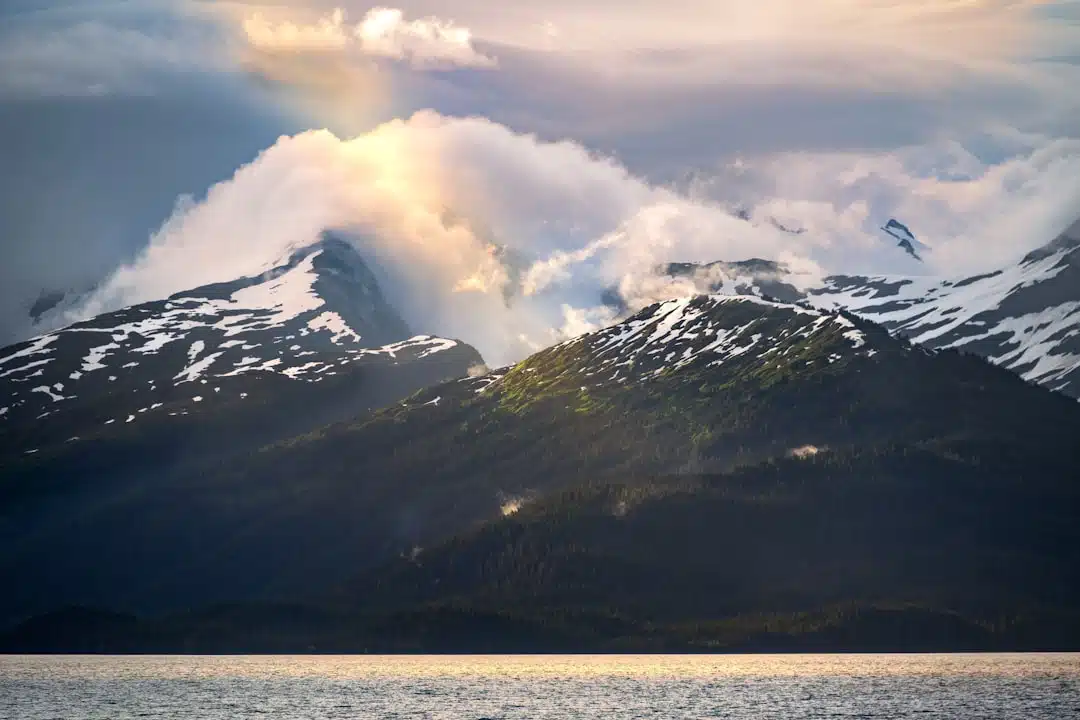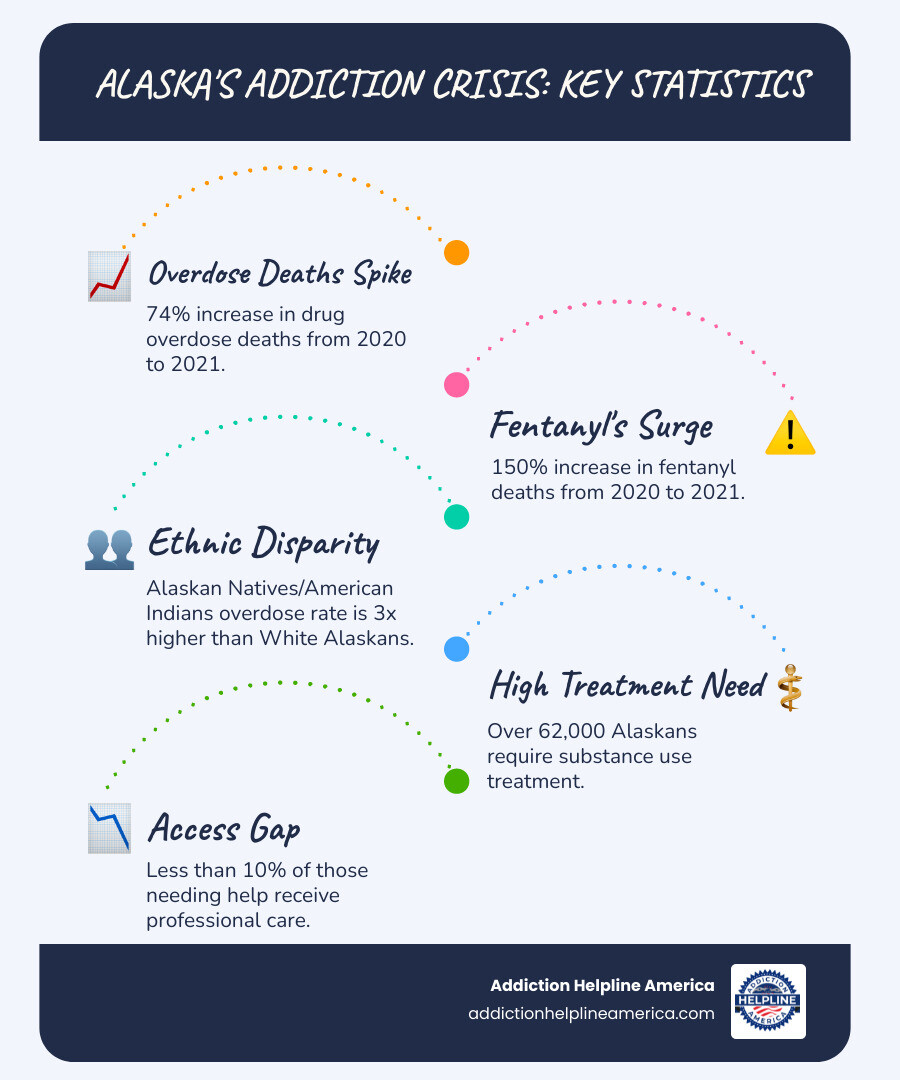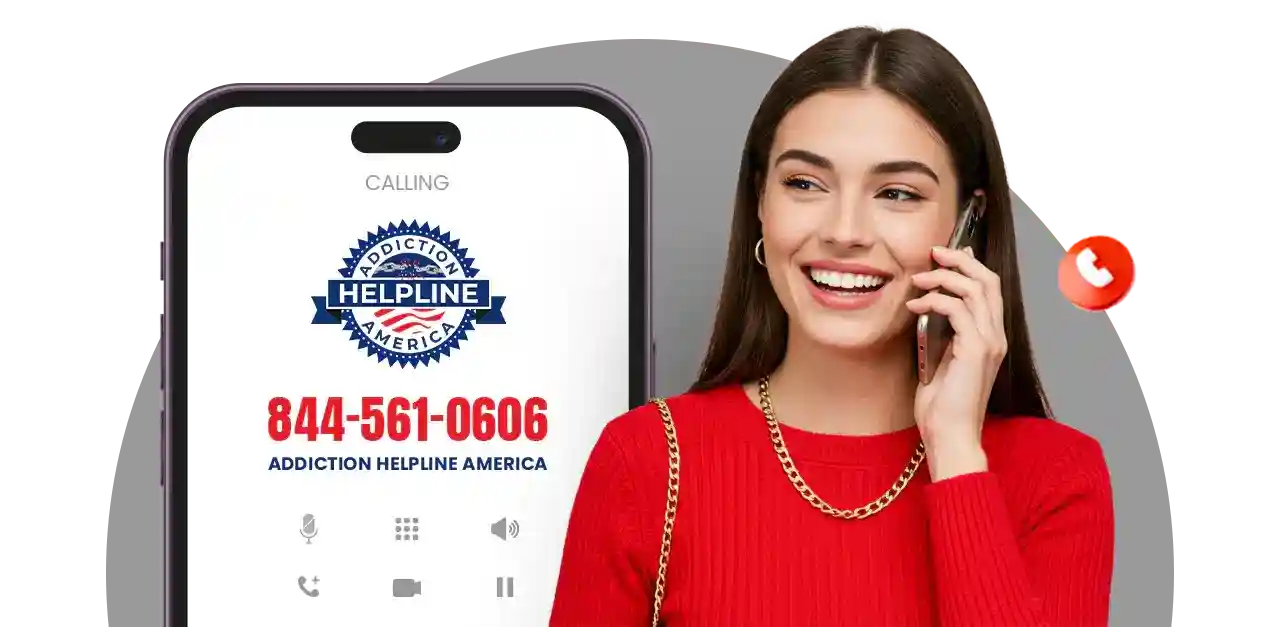
Why Accessible Addiction and Rehab Hotlines/Alaska Numbers Are Essential
Addiction and rehab hotlines/alaska numbers provide immediate, confidential support for individuals and families facing substance use challenges in America’s largest and most geographically isolated state. Whether you’re struggling with alcohol, opioids, methamphetamine, or other substances, help is just a phone call away.
Quick Access to Alaska Addiction Hotlines
| Hotline | Number | Availability | Purpose |
|---|---|---|---|
| 988 Suicide & Crisis Lifeline | Call or text 988 | 24/7 | Emotional distress, suicidal thoughts |
| Alaska Careline | 1-877-266-4357 or text 4help to 839863 | 24/7 | Alaska-specific mental health crisis support |
| Alaska 2-1-1 | Dial 2-1-1 or 1-800-478-2221 | 24/7 | Treatment referrals and community resources |
| Crisis Text Line | Text HOME to 741741 | 24/7 | Text-based mental health support |
| Poison Control | 1-800-222-1222 | 24/7 | Overdose guidance (call 911 for emergencies) |
These hotlines are particularly critical in Alaska, which saw the nation’s highest increase in drug overdose deaths in 2022—a 74% spike from 2020 to 2021. Fentanyl deaths surged by 150%, and the overdose rate for Alaskan Natives and American Indians was nearly three times that of White Alaskans.
The state’s vast geography, with less than 10% accessible by road, creates significant barriers to in-person treatment for its ~730,000 residents. Over 62,000 Alaskans (1 in 9 adults) need substance use treatment, but fewer than 10% receive it. High substance costs, with meth costing up to $1,500 per gram and fentanyl pills reaching $100 in remote areas, fuel trafficking and make addiction financially devastating.
At Addiction Helpline America, we’ve dedicated our work to connecting individuals throughout Alaska with the treatment resources they need, understanding that navigating addiction and rehab hotlines/alaska numbers can be the crucial first step toward recovery. Our 24/7 team provides compassionate, confidential guidance to help you find appropriate care, whether you’re in Anchorage, Fairbanks, Juneau, or a remote village.
Immediate Crisis Support: Urgent Helplines in Alaska
When you need help right now, these crisis hotlines provide immediate intervention. They are different from addiction and rehab hotlines/alaska numbers that help with long-term treatment planning; instead, they focus on keeping you safe in the moment.
988 Suicide & Crisis Lifeline
The 988 Suicide & Crisis Lifeline is a national service available 24/7 for anyone experiencing suicidal thoughts or overwhelming emotional distress. Call or text 988 to connect with a trained crisis counselor for free, confidential support. Specialized options are available for veterans (press 1), Spanish speakers (press 2), and the LGBTQ+ community (press 3), ensuring you can speak with someone who understands your experience.
Alaska’s Careline
For Alaska-specific support, the Careline offers a free, confidential crisis line staffed by counselors who understand the state’s unique challenges, like geographic isolation and long winters. Reach them 24/7 by calling 1-877-266-4357 or by texting “4help” to 839863. They are familiar with local resources and cultural dynamics, providing lifesaving local knowledge.
Crisis Text Line
If talking on the phone is difficult, the Crisis Text Line provides a quiet way to get help. Text “HOME” to 741741 to connect with a trained Crisis Counselor via a secure 24/7 text-based platform. It’s ideal for situations where you can’t speak freely or prefer texting.
Poison Control
For suspected accidental poisoning or overdose, Poison Control offers fast, expert guidance. Call 1-800-222-1222 anytime to speak with medical experts who can advise on the next steps. However, if someone is unconscious or having trouble breathing, call 911 immediately for emergency medical help. These crisis lines are often the first step, designed to keep you or a loved one safe today so there can be a tomorrow for recovery.
Top Addiction and Rehab Hotlines/Alaska Numbers for Treatment Resources
Once an immediate crisis has passed, or if you’re ready to take the first step toward recovery, these helplines can guide you through addiction treatment. They help you find the right program, understand insurance, and figure out where to start.
Addiction Helpline America
We know how daunting it can be to seek help. Our 24/7 hotline is a free, confidential service designed to walk you through your questions and concerns. When you call our Addiction Helpline America’s Alaska Hotline, you’ll reach a caring person who will listen without judgment. We offer support in English and Spanish, taking a personalized approach to understand your situation. We connect you with treatment facilities and support groups from our extensive Alaska network that fit your specific needs. Calling us doesn’t obligate you to anything; we’re here to provide guidance when you’re ready.
Alaska 2-1-1
Addiction often co-occurs with other challenges like housing or financial insecurity. Alaska 2-1-1 is a centralized directory for health and human services across the state. By dialing 2-1-1 or calling 1-800-478-2221, you can get referrals for addiction treatment, housing assistance, food banks, and more. It’s a vital addiction and rehab hotline/alaska number for building a stable foundation for recovery.
Helplines for Specific Demographics
Addiction affects everyone differently. Specialized helplines provide support that understands your specific situation and community.
Youth and Family Support Lines
Addiction affects the whole family. The Boys Town National Hotline (1-800-448-3000) offers 24/7 crisis support for youth and families dealing with substance use and mental health issues, with interpretation in over 140 languages. For families impacted by alcohol use, Al-Anon and Ala-teen (800-356-9996) provide specialized support groups, recognizing that addiction is a family disease.
Veterans Support Lines
Veterans face unique challenges like combat trauma and PTSD that can contribute to substance use. The Veterans Crisis Line provides support from responders who understand military culture. By dialing 988 and pressing 1, veterans and their families can get confidential guidance toward veteran-specific addiction and mental health resources.
Family and Friends Support Lines
Loving someone with an addiction is incredibly difficult. You need support, too. Beyond Al-Anon, many helplines and treatment centers offer guidance for family members. Facilities like South Peninsula Behavioral Health Services in Homer, AK, often have family counseling programs. Taking care of your own mental health is essential for supporting your loved one’s recovery.
Understanding and Using Alaska’s Helplines
Making the first call to an addiction and rehab hotline/alaska number is a courageous step. These helplines are designed to make that moment easier, safer, and more productive. Here’s what makes them so valuable and what to expect.
Why Use Addiction and Rehab Hotlines/Alaska Numbers?
These helplines are designed to remove barriers between you and the support you need.
- Confidentiality: Your conversations are completely confidential and anonymous. Hotlines follow strict privacy protections like HIPAA, creating a safe space to speak openly without fear of your information being shared.
- Free Service: These services are always free. Cost is never a barrier to getting information and support.
- 24/7 Availability: Crises don’t keep business hours. Help is available 24/7, no matter where you are in Alaska.
- First Step to Recovery: A call is a low-pressure way to explore options without committing to treatment, like gathering information for a journey.
- Overcoming Stigma: Hotlines offer a judgment-free space where addiction is treated as a disease, not a moral failing, which is crucial in small communities.
What to Expect When You Call
Knowing what happens when you call can ease any anxiety.
- Trained Advisors: You’ll speak with trained, empathetic advisors, some with personal recovery experience, who are there to support, not lecture.
- No Judgment: You can share your story without fear of criticism. You’ll be met with respect and understanding.
- Needs Assessment: The advisor will ask questions about your situation (substance, location, needs) to best help you. You control what you share.
- Resource Matching: Based on your needs, they’ll provide custom resource matching for detox, outpatient programs, or support groups accessible to you in Alaska.
- Information Gathering: Having details like insurance information can be helpful, but it’s not required to have a valuable conversation.
- No Obligation: Most importantly, there is no obligation to commit to treatment. The call is for information and guidance; the next step is your decision.
How to Support a Loved One
Watching someone you care about struggle is hard. Here’s how you can gently guide them toward help.
- Encourage Calling: Encourage them to call a hotline, framing it as a safe, confidential, no-strings-attached conversation.
- Offer Support: Offer to be present during the call for moral support. Making the call can feel overwhelming alone.
- Express Concern Without Judgment: Talk to them with concern, not judgment. Focus on specific behaviors you’ve noticed and how they worry you (e.g., “I’m worried about you because…”).
- Provide Hotline Numbers: Make it easy by providing specific numbers, like the Alaska Careline (1-877-266-4357) or our number at Addiction Helpline America.
- Learn About Addiction: Educate yourself that addiction is a disease. This helps you respond with empathy instead of frustration.
- Find Support for Yourself: Supporting someone is exhausting. Find support for yourself through resources like Al-Anon or family programs at treatment centers like Anchorage Addiction Treatment Solutions or Tutan Recovery Services. You can’t pour from an empty cup.
Frequently Asked Questions about Alaska Hotlines
Many people have questions before they call a hotline. Here are answers to some common concerns to put your mind at ease.
Are addiction hotlines in Alaska really confidential?
Yes, absolutely. Confidentiality is the foundation of every addiction and rehab hotline/alaska number. They operate under strict privacy guidelines like HIPAA, the same federal laws that protect your medical records. This ensures your call is anonymous and your information is not shared without your consent, creating a secure space to talk freely.
What if I’m not ready for rehab?
That’s perfectly okay. You don’t have to be ready for rehab to call a hotline. Many people call simply to gather information or find emotional support. Hotlines are there to provide options and meet you wherever you are in your journey. You can explore possibilities without any pressure or commitment. The conversation is entirely on your terms.
How do I find local treatment via addiction and rehab hotlines/alaska numbers?
This is a key function of hotlines, especially in a large state like Alaska. Specialists use comprehensive databases to find local treatment options that fit your needs, whether it’s inpatient, outpatient, or detox. They can help verify insurance, check for sliding-scale fees, and find facilities with availability, saving you time and stress. At Addiction Helpline America, we specialize in connecting Alaskans to accessible care within our vast network, navigating the state’s unique challenges to find a solution that works for you.
Take the First Step Towards Recovery in Alaska
The path to recovery in a state as vast as Alaska can seem daunting, but you are not alone. A network of addiction and rehab hotlines/alaska numbers is ready to help. From crisis support via the 988 Lifeline and Alaska Careline to treatment navigation through Addiction Helpline America and Alaska 2-1-1, support is just a call away.
Recovery is happening now across Alaska. Reaching out for help is not a sign of weakness; it’s an act of courage. That first phone call is the start.
At Addiction Helpline America, we’ve built our entire mission around understanding the unique challenges Alaskans face. The geographical isolation, the harsh weather, the high costs, the limited access to care—we get it. That’s why our team provides personalized guidance 24/7, connecting you to treatment centers across our vast network that truly understand Alaska’s reality. We’re not just handing you a list and wishing you luck. We’re walking alongside you, helping you find a recovery program that fits your specific needs, your location, and your circumstances.
The complexity of finding help shouldn’t stop you. The distance shouldn’t stop you. The fear shouldn’t stop you. Every single person who’s found recovery started exactly where you are right now—uncertain, maybe scared, but willing to take that first brave step. Today can be that day for you.
Our helpline is 100%
free & confidential
If you or someone you care about is struggling with drug or alcohol addiction, we can help you explore your recovery options. Don’t face this challenge alone—seek support from us.
Programs
Resources
Will my insurance
cover addiction
treatment?
We're ready to help
Find the best
drug or alcohol treatment
center
Are you or a loved one struggling with addiction? Call today to speak to a treatment expert.





